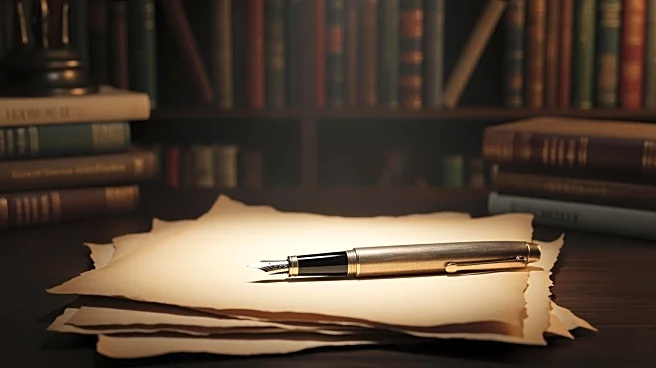What's Happening?
A new collection titled 'Selected Letters of John Updike' has been released, offering a comprehensive look into the personal correspondence of the renowned American novelist. Spanning nearly seven decades, these letters provide a window into Updike's
life, revealing his thoughts on writing, his relationships, and his interactions with other literary figures. The letters highlight Updike's prolific nature and his deep connection to his work, as well as his personal struggles and triumphs. Notably, the collection includes correspondence with famous authors such as John Cheever, Norman Mailer, and Kurt Vonnegut, and offers insights into Updike's views on literature and his own writing process.
Why It's Important?
The release of Updike's letters is significant as it provides a deeper understanding of one of America's most celebrated writers. For literary scholars and enthusiasts, these letters offer a rare glimpse into the mind of a writer who has had a profound impact on American literature. They reveal the personal and professional challenges Updike faced, as well as his unwavering dedication to his craft. This collection not only enriches the understanding of Updike's work but also contributes to the broader discourse on the nature of writing and the literary world. It underscores the enduring relevance of Updike's contributions to literature and offers valuable lessons for aspiring writers.
What's Next?
The publication of these letters is likely to spark renewed interest in Updike's work and may lead to further scholarly analysis and discussion. Literary critics and historians may delve into the letters to explore new interpretations of Updike's novels and essays. Additionally, the collection could inspire adaptations or new works that draw on the themes and insights found in Updike's correspondence. As readers and scholars engage with this material, it may also prompt a reevaluation of Updike's place in the literary canon and his influence on contemporary writers.
Beyond the Headlines
Beyond the immediate literary significance, Updike's letters offer a cultural snapshot of the times in which he lived and wrote. They reflect the social and cultural dynamics of the mid-20th century, including attitudes towards relationships, gender, and the role of the writer in society. The letters also highlight the evolving nature of literary criticism and the publishing industry, providing context for the challenges faced by writers in Updike's era. This collection serves as a testament to the enduring power of personal correspondence as a historical and literary artifact.















